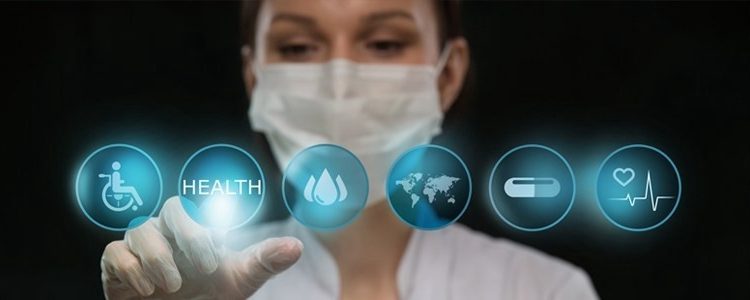
Image Source: digileaders
It is expected that Artificial intelligence (AI) in healthcare will dramatically change the way medicine is used. While some are concerned that these programs will eventually replace doctors, the potential benefits of clinical care are expected to alleviate those fears, especially for radiologists.
The US Department of Health and Human Services has released a report entitled According to the report, one of the greatest challenges of AI in human health and healthcare in How AI will shape the future of public health, community health, and healthcare Physicians, will this technology be accepted in healthcare for clinical practice?
AI in healthcare closer than ever
Shortly, large datasets could allow AI to recognize unusual ultrasound images. The algorithms embedded in the machine system are programmed to know what a normal scan should look like. Rather than having doctors look at countless scans for each patient, it recognizes which scans are abnormal and need to be examined by a radiologist for further consideration. The technology is still in development and needs to be approved by the FDA before it can be used in inpatient care.
How do patients use AI for their health?
AI is already being used all over the world in ways that many people don’t know about. For example, Amazon and Netflix use machine learning algorithms to provide advice to customers. Google Translate doesn’t translate, but it does sort it out quickly. Go through a translated document to make it into a phrase or sentence. Autonomous cars, facial recognition software, some video games, and even health applications all use Different Types of AI technology.
Smartphone apps and wearable devices already help patients monitor and monitor their health. However, when a patient receives information from their device, they may not know what to do with it. A gynecologist patient may use an app to help track her period and ovulation. But she might not mind referring to her app when she sees a doctor.
If you don’t have one, your doctor should be prepared to request this information, get familiar with the apps provided, and know which ones are worth it. While the new generation of electronic medical records (EMRs) is ready to accept the health information that patients collect. But many people don’t The information these patients collect could be helpful for doctors trying to distinguish between a patient’s memory and reality, according to the Pew Research Center, 77 percent of Americans own a smartphone, so doctors have. A great opportunity to use the technology to help patients improve their health.
A 2018 survey published by the University of Pittsburgh Medical Center found that healthcare organizations see AI as a low priority in the next year. But almost all respondents plan to offer health and wellness apps to patients.
Although AI is not yet ready for clinical use. But a gynecologist may want to prepare in several important ways. An image manipulation system that automatically places the ultrasound images in the EMR, stores them in the cloud, backs up the images, and allows them to be viewed or shared remotely, making it easy to switch to an AI-backed system.
Whether the practice is just getting started or expanding and updating, owners should be looking to invest in equipment built with advanced analytics in mind. Practices should pay attention to patient information security protocols as many AI systems depend on remote neural networks to parse the data.
Perhaps most importantly, private sector practitioners should be open to the benefits that AI in healthcare may bring, ultimately creating more time to focus on patient care.
There is a growing interest in the use of Artificial intelligence Development Company services in obstetrics and gynecology. These AI applications not only monitor the health of women during pregnancy but also help to improve the universal provision of health services, especially in the most backward areas. Therefore, the field contributes to improving personal and public health, ”said Maria del Carmen Romero, a researcher at the University of Seville.
Also, this work reveals a total lack of studies that consider emotions as input parameters in models to assess risk in pregnancy (only 1.28% of the studies analyzed). Also, very few studies closely analyze the mental health of a pregnant woman (only 5.1% of the studies studied) show that women’s mental health is associated with an increased risk of developing certain diseases of pregnancy. Pregnancy is an important condition that requires changes and new learning, which can lead to anxiety, fear, anxiety, and depression in women.
Systems based on affected computing can allow emotional interaction with a pregnant woman and, for example, detect emotional changes and provide guidance or recommendations that the system has previously received from physicians. It makes the patient feel safe and close to her health service and sometimes reduces general feelings of anxiety or worry, which can sometimes lead to physical problems.
“Since there is previous scientific evidence supporting the idea that a pregnant woman’s mental state and mental health can affect the risk of accidents during pregnancy, our study highlights what is most appropriate for effective multidisciplinary research in this area of effective computing. Health and Prosperity of Pregnant Women
USM Business Systems is one of the leading service provider in Artificial Intelligence, HR Management systems, App Development, Data Quality solutions, Work Force Service to build interactive experiences for all major platforms. As a prominent Mobile development company, we are delivering top-notch and high-quality App development services to various brands and businesses irrespective of the industry.
WRITTEN BY
SEO Executive and a Content Writer interested to write on Artificial Intelligence, Mobile App development, Machine Learning, Deep Learning, HRM & tech Blogs
